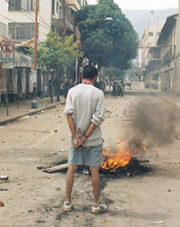|
May 15 , 2000 Collateral
Damage Under
Siege The
IMF: Kill It or Fix It? How
to Fix the IMF
Water
Fallout ICANN:
Secret government of the Internet? The
Big Payback Editorial Appall-O-Meter No
Justice for Janitors Wal-Martyrs
Fishy
Business Wasted
Profile
The
Culture Vultures Left
in the Dust Queer
Godfather No
Jacket Required Rememberance
of Things Trashed |
Water Fallout:
Bolivians battle globalization
By Jim Shultz
As thousands of people were preparing to march on Washington to protest the unchecked global economy, in Bolivia an enormous uprising of workers, farmers and other ordinary people won a major battle against globalization, kicking the San Francisco-based Bechtel Corporation out of the country.
 |
|
To
protect corporate interests,
Bolivia declared martial law. Credit: Tom Kruse |
The roots of the recent uprisings were planted last year when the Bolivian government, under pressure from the World Bank, sold off Cochabamba's public water system to Bechtel subsidiary Aguas Del Tunari (see "Water War Zone," April 17). While the financial details of the deal have been kept secret, Bechtel's interest was clear: to fleece Bolivians of as much of their tiny incomes as quickly as possible. Within weeks of hoisting up their new corporate logo, they hit water users with rate hikes of double and more. Families earning a minimum wage of less than $100 per month were expected to fork over $20 or have the tap shut off. For World Bank economists and Bechtel executives, that's lunch money. For Bolivian families, it's food for more than a week.
In January, Cochabamba's residents shut down their city for four days with general strikes and transportation stoppages. The Bolivian government promised to lower water rates, and the protests ended. But within a few weeks, that pledge was broken. On February 4, thousands attempted to march peacefully in Cochabamba. But President Hugo Banzer - who was Bolivia's Pinochet-style dictator for most of the '70s - returned to his old ways. Banzer called out the police, who engulfed protesters in tear gas for two days, leaving 175 injured and two youths blinded.
The people of Cochabamba didn't back down. In a survey of more than 60,000 residents in March, 90 percent said it was time for Aguas Del Tunari to go and for the water system to be returned to public control. Residents closed down the city again starting on April 4. But once again, the Bolivian government came to Bechtel's rescue. Four days into the demonstrations, the Bolivian government declared martial law. Police arrested protest leaders, taking them from their beds in the middle of the night, shut off radio stations in mid-broadcast, and sent soldiers into the streets.
On April 8, the Bolivian military shot 17-year-old Victor Hugo Daza in the face, killing him. "The blood spilled in Cochabamba carries the fingerprints of Bechtel," says protest leader Oscar Olivera. On April 10, the government finally conceded, signing an accord that agreed to every demand the protesters had made. The people of Cochabamba rejoiced at the victory and the city's normal pace of life returned the next day, just as Banzer started cranking up his PR machine. One spokesman referred to the protesters as narcotraffickers. That lie was repeated by naďve reporters and editors worldwide. Meanwhile, Bechtel put out its own spin. "We are also dismayed by the fact that much of the blame is falsely centered on the government's plan to raise water rates in Cochabamba," read a company statement, "when in fact, a number of other water, social and political issues are the root causes of this civil unrest."
It's true that the strength and international attention of Cochabamba's water protests did embolden - and become linked with - other protests around the country, such as marches in the countryside against a new law ending public control of rural water systems, a police strike in the capital city of La Paz, and complaints about unfinished highways. But the people who marched 70 miles on foot from small towns to join the Cochabamba protest, the thousands who filled the city plaza day after day, and the women who went door to door gathering food donations to cook for the protesters, all clearly demonstrate that the uprising was over Bechtel. The fuse was the rate hikes, and narcotrafficking had about as much to do with it as Elián González. "This is a struggle for justice," says the mayor of a small town, who walked for 12 hours to join the protest, "and for the removal of an international business that, even before offering us more water, had begun to charge us prices that are outrageously high."
In the emerging battle over global economics, the humble people of this easily forgotten country have offered the world a powerful lesson.
Jim Shultz, executive director of The Democracy Center (www.democracyctr.org), lives in Cochabamba.
|
In These Times ©
2000
Vol. 24, No. 12 |
